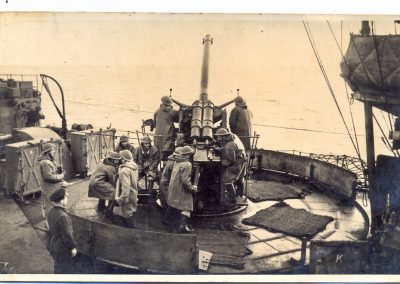The following summary has been written by Aleksander’s son and volunteer researcher, Peter Szypko.
Aleksander Szypko was born on 24 October 1918 in the village of Maciasy, near Glebokie in eastern Poland (now part of Belarus). Although their ethnicity was Belarusian, the family became Polish citizens from 1920, when the area became part of the 2nd Polish Republic. Aleksander worked on his father’s farm from the mid-1930s.
The consequences of the Soviet Union’s invasion of Poland on 17 September 1939 on his life were far-reaching. For a while, he continued to work as a farmer under soviet rule and their collectivisation policies. In May 1941, he was forcibly conscripted into the Russian army and posted to a training camp in South-West Russia. He was transferred seven weeks later to a Labour Battalion near Kirov in North Russia where he experienced hard labour. This was followed by confinement in another Labour Battalion near Nizhny Tagil in Eastern Siberia. In March 1942, after nearly nine months in captivity, he may have been released under Stalin’s ‘amnesty’ arrangements but more probably escaped.
Aleksander enlisted in the Polish army a day later at Sverdlovsk in Northern Russia. He then travelled to Uzbekistan where he was assigned to the 24th Infantry Regiment, 8th Division under General Wladyslaw Anders. The Regiment evacuated Russia via the Caspian Sea to British-controlled Iran in late March 1942. Having volunteered to join the Polish armed forces in Great Britain, an epic journey then ensued involving stops en route in Palestine, Egypt and South Africa. He arrived at Liverpool on 5 September 1941 and opted to join the Polish Navy whilst stationed at Auchtertool, Scotland.
Having received training as an artillery operator specialist, he served in the Polish navy from September 1942 to September 1946 and was promoted to the rank of Able Seaman in 1946. He served on the destroyer ORP Piorun from 1942 to 1945 and then the ORP Krakowiak, another destroyer, from 1945 to 1946. Key campaigns and battles in which he participated included Arctic convoys (1943), Atlantic Convoys (1943 to 1945), the Allied landings in Italy and Sicily (1943) Allied D-day landings at Normandy (1944) and the Battles of Ushant and Jersey later in June 1944. Aleksander was decorated with five British medals – the 1939-1945 Star, Atlantic Star, Italy Star, Arctic Star and France & Germany clasp. He also received two Polish medals – the Sea medal (Morski) with a bar and a Medal for Valour.
Aleksander’s key moment during the Second World War was probably his bravery action at the Battle of Jersey on 14 June 1944. He helped to save the ship from serious damage and loss of life when an enemy missile crashed through a door of a nearby ammunition store and caught fire. With others, he risked his life by disposing of shells overboard likely to explode at any moment.
He spent two significant periods of time at the Polish Naval Camp at Okehampton. In March and April 1945 he was placed on reserve there whilst awaiting a change of ship. From September 1946, he was posted at the camp again following the decommissioning of the ORP Krakowiak. From March 1947, the camp transformed into a Resettlement Centre for those who wished to remain in England. He enlisted in the Polish Resettlement Corps in that month. Although based there until August 1948, Aleksander would have spent periods away from the camp on various work experience detachments.
In August 1948, he moved to the outskirts of Exeter where he was employed as a caretaker at a country house. Later he worked on building sites – firstly as a labourer and then as a painter and decorator. Marrying an English lady in 1958, he had two sons and remained in Exeter for the rest of his life, dying there in 2010.
Aleksander’s son, Peter, recorded an oral history interview about his research into his father’s life. You can listen here.


